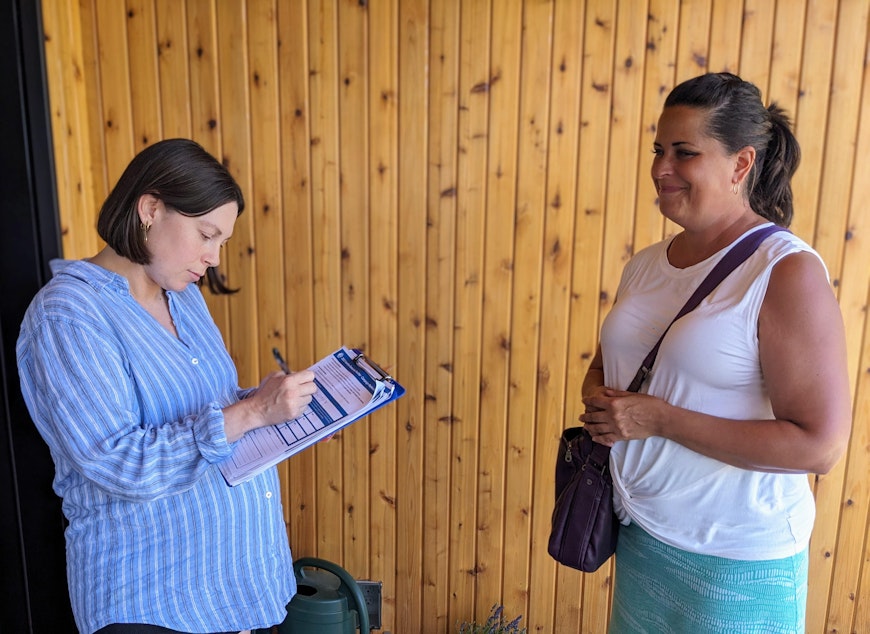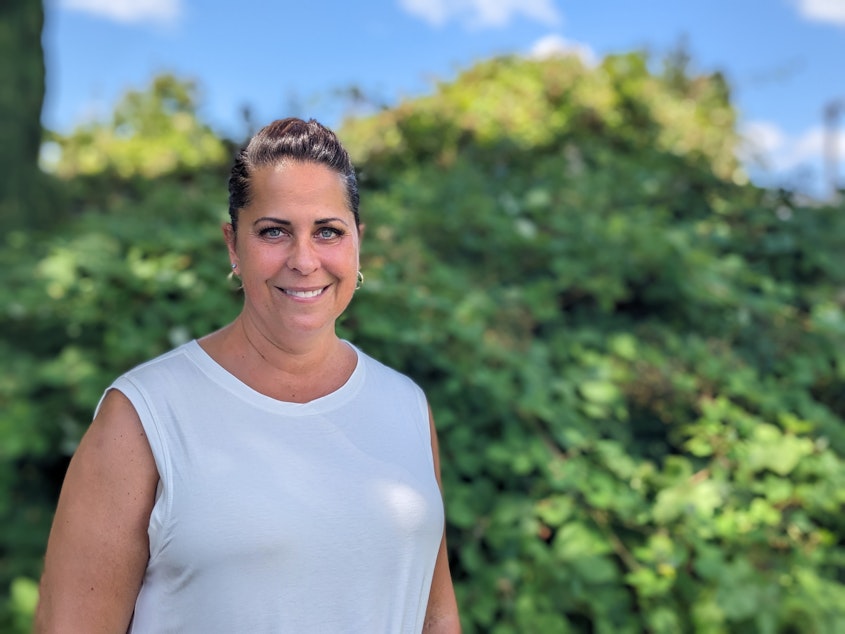Fired Amazon employee-activist leads Seattle City Council race

Seattle City Council candidate Maren Costa was knocking on doors in Seattle’s South Park neighborhood, ahead of Tuesday’s primary, when she came across a house that stood out.
It was in the modern, mixed materials style that developers of new construction tend to favor. In many neighborhoods, it would’ve blended in, but it cut a sharp contrast with the small, older homes surrounding it.
“What about the poor neighborhoods, like South Park?” asked resident Nikki McCall after Costa made her pitch, as part of her City Council campaign. “I mean, we are a gentrifier, as you can probably tell, but this is a blue-collar neighborhood.”
South Park struggles with pollution of every kind. It’s a major artery for car travel. The Duwamish River that runs through it is a toxic superfund site, and there’s constant noise pollution from air travel. Still, South Park hasn’t escaped the affordability crisis plaguing the city.
“People die here earlier,” McCall said.
Costa agreed — 13 years earlier than Laurelhurst residents, she said.
McCall is pregnant with her first baby, expected any day now. Between the Duwamish flooding, pollution, and crime, she said she feels like her neighborhood has been left behind.
“A huge part of my platform is climate justice,” Costa told McCall. “It's not just climate, it's climate justice and making sure that we know that the climate crisis will hit the most vulnerable and the poorest communities first, and worst.”
Climate justice is the centerpiece of Costa's campaign — an agenda with roots in an unusual place. She spent more than a decade as a UX designer at Amazon — until she got fired. Costa says Amazon let her go because she became an increasingly outspoken member of an employee-activist group putting pressure on the company over its carbon footprint. Amazon denies that claim.
Costa led the primary election this week for District 1's hotly contested Seattle City Council seat. The district covers West Seattle, where Costa lives, as well as South Park, SoDo, the Industrial District, and Georgetown.
Costa appears to be the first person from the employee activist movement to run for office. We talked to experts who study employee activism and why people go into politics. None of them could find another example.
“There has certainly been a huge rise in tech worker activism,” said Samantha Gordon of the Bay Area non-profit TechEquity Collaborative. “But I'm not aware of any tech worker activist running for public elected office.”
For decades, worker activism has been mainly focused on one goal: improving conditions for workers at their jobs. But in recent years, a new trend has emerged in the tech industry, that breaks with that tradition.
Tech workers are looking beyond their workplaces, and high demand for their skills means they have the power to pressure their employers on other issues. That power may have softened slightly in the era of tech layoffs, but demand for software talent remains strong.
Costa may be the first, but experts don’t expect her to be the last. Some even said tech worker activism could become a pipeline to politics.

Before becoming an activist, Costa tried to make changes at Amazon through more traditional channels. At first, she just pitched features that would allow Amazon customers to reduce the carbon footprint of their purchases. One idea: show customers how far products would have to travel, so they could pick the closest seller.
“But when it came to climate, it was just like, talk to the hand,” Costa said in an interview. “Nobody wanted to engage.”
She found another path. Costa joined Amazon Employees for Climate Justice, which spearheaded the tech worker activist trend. The group circulated petitions and held walkouts to pressure Amazon to create a formal sustainability plan. Costa says Amazon launched its signature Climate Pledge in response to their activism.
Amazon declined to be interviewed for this story, but a spokesperson said Amazon’s sustainability goals were already in the works when the group started organizing.
“We wouldn't have done what we did if they were just marching right along and leading in the way that Amazon would normally lead,” Costa said. “I wouldn't have felt like I had to do that.”
The scope of Costa’s activism widened when the pandemic hit. Amazon’s corporate employees were able to work from home, but warehouse workers remained on the front lines. Amazon faced threats internally from union drives and externally from critics who said warehouses were unsafe.
When Amazon Employees for Climate Justice began showing solidarity with warehouse workers, Costa landed in hot water. She and a colleague were fired within two hours of inviting coworkers to a virtual town hall with warehouse staff.
The Amazon spokesperson said they were fired for violating internal policies.
The National Labor Relations Board ruled the firings were illegal. Amazon agreed to pay back wages to the fired employees as part of a settlement agreement.
The episode launched Costa into the public eye. She hopes to use that exposure, plus her background in Big Tech and activism, to beat her most likely opponent, Rob Saka. He also has roots in tech, but not as an employee-activist.
Saka has the more centrist Seattle Times endorsement, while Costa has the left-leaning Stranger’s.
Both candidates appear to be headed to the general election in November, though votes are still being counted.

